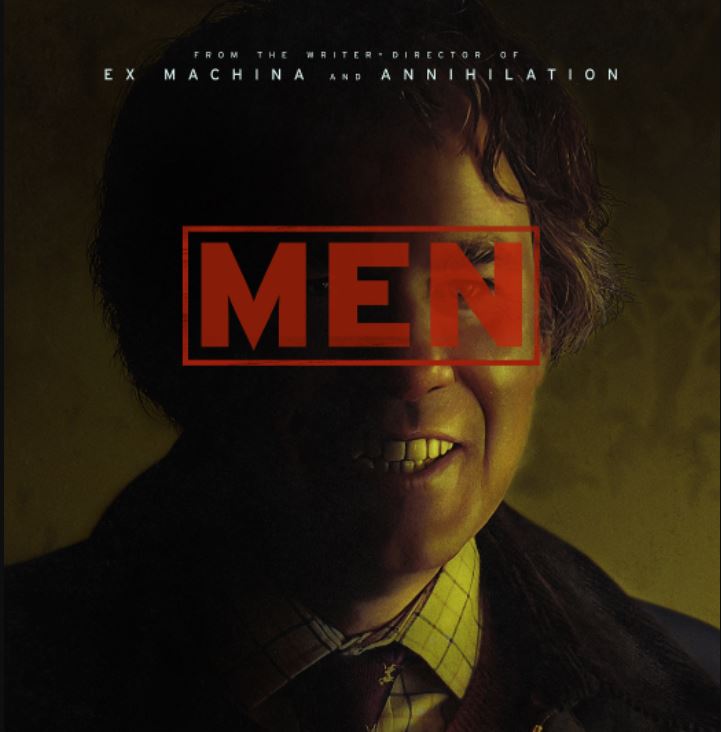Review | ‘Men’ has a lot to say—but is it worth listening?
June 1, 2022
In his shocking new horror, “Men,” writer-director Alex Garland asks questions about men in society — but expects the audience to fill in the blanks.
The story opens after Harper (Jessie Buckley) loses her husband tragically. All she wants now is rest. She settles in an idyllic 500-year-old English countryside estate for two weeks of peace and quiet. Yet peace only lingers on the surface of Garland’s new and, at times, thought-provoking horror thriller.
Harper, after being introduced to the house by the amicable but oafish Geoffrey (Rory Kinnear),
decides to explore the woods. As she wanders, Harper comes across an old train tunnel which she finds has excellent acoustics.
With childlike wonder she calls into the darkness, letting the echoes eventually form into a sort of song which plays around her as she enters the tunnel. But the song is cut short when a hunched, manlike figure rises from the distant shadows and abruptly shrieks and sprints towards her in the dark. Harper, in a panic, flees back into the woods.
When she realizes the man is no longer following her, she shakes off her anxiety and passes through a set of dilapidated buildings towards an open field. As she turns to take a photo of the broken scene to send to her friend back home, she notices the man, naked and covered in cuts, staring from the photo. It’s a tense, confusing and ultimately brilliant introduction to the men who watch and haunt women in modern society.
At its core, “Men” wants to have a conversation — a conversation about the often-grim reality of being a woman in a strange place. The film displays the dangers of the vocal and silent men who bubble with rage, desire and animosity towards women in society.
Like the shrieking man, the titular men come in all shapes. Geoffrey, the groundskeeper and first man we meet at the estate, is a simple country man. Described as such by Harper, he often doesn’t understand the nuances of city or modern living. While well-meaning at times, he is often shaded with animosity, which comes between his words as ignorant comments about women and being divorced. The same is true for most of the men, even though they practice several different occupations — from preacher to police officer to barman.
Garland, writer of “28 Days Later” and “Ex Machina,” has a lot to say about men and the ways in which they endanger or discomfort women, and does so by exploring the different archetypes of these individuals. While there are certainly flashes of brilliance, and superb acting by both Buckley and Kinnear, Garland stretches his narrative too widely to earn his shocking and otherwise rushed conclusion.
For all the ending’s faults, the first 40 minutes of “Men” are as engrossing as they are ambitious. The film presents the viewer with several troubling but necessary thoughts on modern men and society, such as why some hate or look down on women and why others use their power to manipulate them.
But following the arrest of the shrieking naked man, and a scene in which Harper laments that she is being misunderstood by the police officer and Geoffrey, the men all but disappear for the sake of horror. Each is reduced to a roaring, chasing beast rather than representing societal themes like earlier in the film.
Before the disappointing flourish, Garland’s brilliance does shine in perhaps the best portrayal
of problematic men in the movie.
The preacher, a judgmental and obtuse character Harper meets earlier in the film, returns. Shuffling into the bathroom and closing the door behind him, he begins a Shakespeare-style soliloquy in which he muses on the temptations of women. Harper, standing behind the bathtub, bloody and with knife in hand, falls into a sort of trance as the preacher laments on the perils of a woman’s siren’s song.
Garland evidently wanted temptation to be a secondary theme, as Geoffrey makes an opening quip about forbidden fruit after Harper eats an apple from the garden. But this, too, never goes anywhere, unless Garland intended it as a vehicle for the preacher’s brilliant and unsettling words in which he likens a woman’s privates to the tip of a knife.
The preacher is a reminder that, to some men, their aggression or animosity towards women isn’t their fault. “She made me do it,” men would say. “Just look at how she’s dressed or how she talks.” The startling unease and tension of the moment is brilliant, and Garland needed more moments like this to make his film something special. Instead, the conversations once again end too soon, and we are treated to a final chase sequence. The rushed but admittedly grotesque conclusion, a metaphor on the vicious cycles of grief, ultimately feels overlong and unwelcome.
Garland’s film wants to be a lot of things — a conversation about men and their thoughts on women, a psychological thriller in which a woman must face her grief, and a parable to Eve’s temptation by the forbidden fruit. But none of those ever come to fruition. Perhaps with a longer run-time, “Men” could have been those things.
Garland wished to leave his loose threads up to interpretation, and I applaud that effort in other films, but in this one he didn’t have to. In the end, “Men” simply struggles to put a period on its story, even if it is an otherwise enjoyable film.








